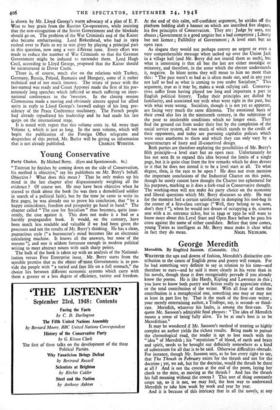Young Conservative
Party Choice. By Michael Berry. (Eyre and Spottiswoode. 6s.)
"THOUGH he finishes by coming down on the side of Conservatism, his method is objective," say his publishers on Mr. Berry's behalf. Objective ? What does this mean ? That he only makes up his mind in the last chapter after dispassionately weighing all the evidence ? Of course not. He may have been objective when he started to think about the book (he was then a demobilised soldier in search of a political faith), but by the time he came to write its first pages, he was already out to prove his conclusion, that "by a happy coincidence, freedom and prosperity go hand in hand." The chapter called "The case for Socialism" thus becomes, quite inno- cently, the case against it. This does not make it a bad or a harshly propagandist book. It would, on the contrary, have been much less readable and valuable if we had been given the processes and not the results of Mr. Berry's thinking. He has a clean, pugnacious style (" a bureaucrat's mind becomes like an electronic calculating machine. It knows all the answers, but none of the reasons "), and one is seldom fortunate enough in modern political writing to meet abstract nouns with such sharp points.
The bulk of the book is taken up with an analysis of the National- isation versus Free Enterprise issue. Mr. Berry starts from the sensible premiss that as the object of most Governments is to pro- vide the people with "a varied and free life on a full stomach," the choice lies between different economic systems which carry with them a greater or a less degree of efficiency, variety and freedom. At the end of this calm, self-confident argument, he strides off the platform holding aloft a banner on which are inscribed five slogans, his five principles of Conservatism. They are : Judge by uses, not abuses ; Government is a good umpire but a bad competitor ; Liberty but not licence ; Fallibility of Government ; A level start but an open race. As slogans they would not perhaps convey an urgent or even a very comprehensible message when tacked up over the Union Jack in a village hall (and Mr. Berry did not intend them as such), but what is interesting is that all but the last are either nostalgic or minatory, and therefore, in the sense which the elector understands it, negative. In blunt terms they will mean to him no more than this : "The past wasn't as bad as is often made out, and in any case not half so bad as what is coming to you under Socialism." This argument, true as it may be, makes a weak rallying call. Conserva- tives suffer from having played too long and important a part in English political history. Today their principles are dulled by familiarity, and associated not with what went right in the past, but with what went wrong. Socialists, though it is not yet so apparent, are facing very much the same dilemma. The emotional basis of their creed also lies in the nineteenth century, in the subjection of the poor to intolerable conditions which no longer exist. They find the ground cut from under their feet by the completion of the social service system, all too much of which stands to the credit of their opponents, and today are pursuing capitalist policies which were once anathema to them and which they can only vary by a superstructure of hasty and ill-conceived design.
Both parties are therefore exploring the possibilities of Mr. Berry's fifth principle—a level start but an open race. Unfortunately he has not seen fit to expand this idea beyond the limits of a single page, but it is quite clear from the few remarks which he does devote to it that he does not intend it to be a level start at all. To what degree, then, is the race to be open ? He does not even mention the important conclusions of the Industrial Charter on this point, though he surely cannot have thought the Charter too ephemeral for his purposes, marking as it does a fork-road in Conservative thought. The working-man will not make his party choice on the economic and liberal questions which Mr. Berry discusses so ably. He may for the moment feel a certain satisfaction in dumping his tool-bag in the corner of a first-class carriage (" Well, they belong to us now, don't they ? "), when he would not dream of occupying a 6s. cinema seat with a 25. entrance ticket, but in 1949 or 1950 he will want to know more about this Level Start and Open Race before he puts his cross against the name of either candidate. Before that time comes, young Tories as intelligent as Mr. Berry must make it clear what


































 Previous page
Previous page